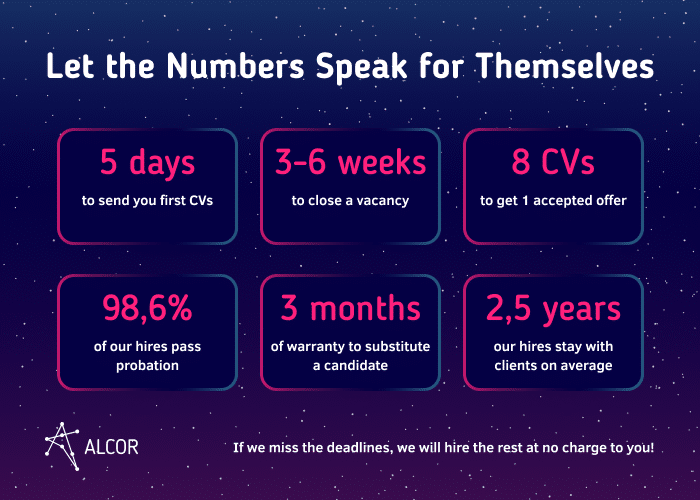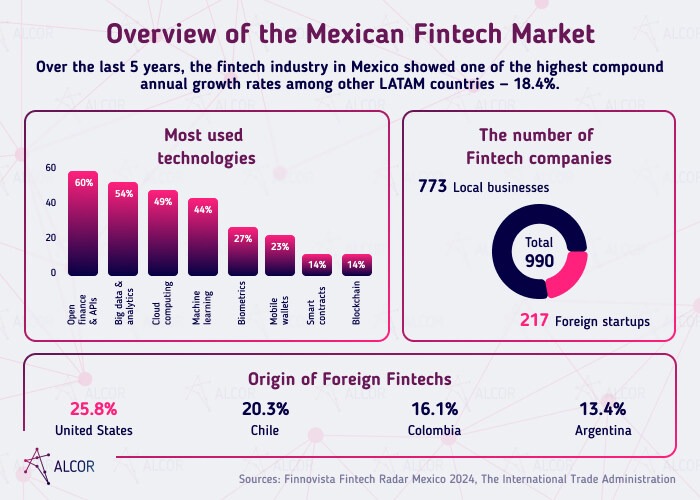When it comes to the employer-of-record model vs the staffing agency model, some tech businesses might need help to choose between them, as they may not fully understand the difference. Long story short, EORs are best suited for employing (not recruiting, though) developers, onboarding them, and handling their payroll, taxes, and other administrative functions. This market is gaining momentum and is expected to hit a staggering USD 6,6 billion by 2028. On the other hand, staffing agencies help tech companies with everything from candidate sourcing to offer management. No wonder global staffing revenue reached $593 billion in 2023. Should you choose either of them, both, or none? Let’s find out together.
I’m Viktoriia Keliar, Chief Operations Officer at Alcor, an R&D center provider that delivers tech recruitment and EOR services with unmatched savings for Western tech product companies in LATAM and Eastern Europe. With Alcor, tech product companies experience incredible growth, scaling from 0 to 100 Silicon Valley-grade developers in one year without the need to set up a legal entity or pay buy-out fees.

In this article, I’ll give the definitions and critical functions of an Employer of Record vs. a staffing agency, compare how much they cost, uncover what businesses will benefit from these models, help you choose between them, and tell more about Alcor all in one solution for your tech business that combines the functions of both and offers you much more for global expansion. So, let’s start!
Breaking Down Employer of Record Model
An Employer of Record (EOR) is an external service provider that legally employs international staff on behalf of their clients. This provider handles payroll, tax compliance, employee benefits, onboarding and offboarding processes, along with other administrative responsibilities.
The primary services provided by EOR vendors are the following:
- Performing background checks: Verifying candidates’ credentials and employment history.
- Handling employment contracts: Preparing, negotiating, and renewing different types of employment contracts on behalf of the client so the client doesn’t have to set up their legal entity abroad.
- Onboarding and offboarding developers: Setting up sole proprietorships or equivalent entities for new hires, opening bank accounts, handling the closure of such entities, and transferring the necessary equipment back to clients after ending cooperation with international and local hires.
- Remitting payroll: Transferring funds from the client to the provider for employee salaries, taxes, and service fees, as well as handling HR payroll and accounting.
- Managing taxes: Tax planning, tax payments, tax return preparations, and tax compliance advisory and consultation.
- Administering employee benefits: Managing benefits such as health and life insurance, gym memberships, internal and external education, English courses, stock options, etc.
What else you need to keep in mind is to distinguish between EOR and PEO and choose the right one for you. A PEO, or Professional Employer Organization, offers outsourcing of HR services on a shared employment basis. Considering the pros and cons of PEO, it provides SMBs with expert HR services and allows them to act as legal co-employees. Although such a provider offers a wide range of services, including managing hiring and firing, training, performance, benefits, risk management, and legal compliance, this model involves setting up a legal entity abroad and may incur additional costs and liabilities.
Key Things to Know About Staffing Agencies
A staffing agency is a company that assists tech companies in hiring developers, covering the whole talent acquisition process—from candidate sourcing and interviews to offer management and some onboarding aspects.
Such vendors come in various flavors, each specializing in different staffing types:
- Temporary—provides developers to perform short-term assignments or cope with higher seasonal workloads to fill the skills gaps in the company quickly;
- Temp-to-hire—offers developers temporary with the potential for permanent hiring if the employee meets performance expectations and fits well with the company;
- Project-based—provides developers specifically for a specific project;
- Permanent—focuses on recruiting developers for the long term who will be either in-house or R&D employees of a company.
How do IT staffing agencies work? To understand the model, it’s essential to examine a specific set of staffing services they offer:
- Tech talent market guidance: Providing insights and advice on current tech recruitment trends and overall landscape, salary benchmarks, candidate availability statistics, and comparison of different foreign tech markets.
- Talent sourcing: Proactively identifying and engaging with top-tier candidates via external platforms such as LinkedIn, various social media, job boards, and an internal talent network.
- Pre-screening: Evaluating and filtering candidates at the beginning of the recruitment process to ensure they meet the required qualifications and fit the role before the client’s review.
- HR & technical interviews: Conducting an initial interview to assess candidates’ hard and soft skills, cultural fit, and English level. Providing feedback for all candidates is also a must. Plus, helping clients conduct technical interviews and/or test tasks.
- Job offers’ management: Preparing and extending job offers to the best candidates, negotiating cooperation terms and conditions, and working with offer rejections and counteroffers.
- Onboarding: A staffing firm’s workflow also involves introducing new hires into the client’s team and other departments through basic orientation, guidance, and support.
When you compare a staffing agency with an Employer of Record provider, you’ll find that staffing agencies focus on attracting and hiring skilled developers. These professionals are then employed and managed from a legal and administrative standpoint by an EOR for global staffing. But what are the costs of these services?
Employer of Record vs Staffing Agency: Cost Comparison
To help you understand the costs of EOR and staffing services, our team has compared the pricing of various agencies and platforms, which is presented below:
| Employer of Record | Staffing agency | |
| Average fee per developer | $499-$699 per month | One-time fee of 15-30% of an annual developer’s salary |
| Region/Position difference | The price depends on the country and its economic development:
| The price depends on the position level:
|
However, the price difference between the Employer of Record and staffing agency services is not the only crucial factor. Equally important are the developers’ employment model, administrative support, risk mitigation, and the necessity of establishing a legal entity. Curious about this? Continue reading to get the complete picture!
Employer of Record vs Staffing Agency: Which is More Effective?
To uncover the secrets behind the most efficient model and fully leverage the benefits of using employer of record and staffing services, I recommend diving into a comparison of their key pros and cons:

EOR
When navigating the complexities of a global workforce, Employer of Record services become the go-to solution for:
- Companies expanding to one or multiple foreign countries
- Businesses lacking internal capacity (lawyers and accountants)
- Startups and small to medium-sized businesses
Staffing Agency
In contrast, staffing services are typically chosen by:
- Companies expanding to a foreign country where they’ve set up their legal entity
- Companies with high-volume staffing needs for product development (10+ people)
- Medium & large businesses
How to Choose Between an Employer of Record and a Staffing Agency?
To help you better understand which service suits your needs and make a practical choice between an EOR vs a staffing agency, we’ve prepared a short guide for you to select the best model:
1. Employment Relations
Reflecting on the employer-employee relationship that best fits your needs is crucial. If you’re seeking a comprehensive, long-term employment solution with complete legal and administrative backing, an Employer of Record acting as a full legal employer is likely your best bet. However, if you value direct hiring, prefer to retain more control over your employees, and, most importantly, have a legal entity in a foreign location, a recruitment agency might be the better choice.
2. Tech Recruitment Needs
If you don’t have an internal recruiting team or have a small crew and need help hiring a qualified workforce, then you should hire a reliable tech staffing agency. However, if you have a recruiting team that does a great job but needs help employing and managing these employees from an administrative standpoint, then an EOR provider would be the go-to option.
3. Required Back-Office Support
For expert support with onboarding and offboarding employees, managing payroll, handling tax withholdings and filings, administering benefits, generating employment contracts, and ensuring compliance with local law insights, an EOR provider is essential. However, if your company handles these tasks effectively but struggles with offer rejections and delays in closing vacancies, a staffing agency might be the solution you need.
4. Long-Term Orientation
If your employees are not necessarily going to stay with you long-term, hiring an EOR provider may be optional. In this case, it’s wiser to use the services of a staffing agency that can provide staff for any duration: from temporary and project-based employees to those you may eventually want to hire for the long haul. However, suppose you’re looking to recruit permanent team members who will seamlessly integrate into your internal team, embrace your corporate culture, and contribute significantly to product development. In that case, setting up your own legal entity or partnering with a reliable Employer of Record provider is advisable. Additionally, hiring full-time employees entails much higher taxes, significantly affecting your expenses. For instance, when examining taxes in Romania, the cost an employer incurs for an employee under an employment contract is typically 1.5 times greater than for an individual working under a B2B contract—a crucial factor for companies looking to optimize their payroll expenses.
5. Cost Difference
Furthermore, when you compare an EOR model and a staffing agency, one final factor to keep in mind is the price difference. EOR companies usually have a flat fee for their solutions, while staffing agencies charge a percentage fee from an annual developer’s salary. Moreover, the cost of the staffing provider depends on the level of the position, its complexity, and the country where you want to hire specialists.
Here’s a clear example: considering the average annual software developer salary in Mexico, Poland, and the United States, the recruitment agency fee for hiring senior Java developers is approximately $13,200 in Mexico, $16,800 in Poland, and $22,800 in the USA, demonstrating significant disparities and the need to carefully consider salary and income differences across various countries or regions.
You may opt for staffing services if you need to hire highly skilled developers, or an Employer of Record if you need help processing payroll and handling tax compliance. You can also use both types of services if that fits your needs. But the most important thing to remember is that an integrated model is more efficient and effective in the long run and can increase productivity while allowing you to focus on what matters most—growing your business—while a trusted provider takes care of all administrative and compliance issues. And Alcor is here to help you!
Meet Alcor — a Model That Combines IT Staffing and EOR
Whether you are looking for the perfect match with your future IT staffing or EOR provider, or you are considering a more comprehensive approach like the Build-Operate-Transfer model, we have the better offer—an all-in-one place solution without buy-out fees and a transfer stage.
With Alcor, you will forget the constant need to synchronize services from different providers and deal with higher costs because we offer unmatched savings with 360° operational support!
With clients like ThredUP, Dotmatics, and others, we excel not only in recruiting top-tier software developers from our internal 253k+ candidate network for even the rarest positions but also in managing payroll, tax payments, legal compliance, and procuring necessary infrastructure for developers. Additionally, we assist with office search and leasing, ensuring fully transparent business operations in LATAM and Eastern Europe.
Just as we have for these companies, Alcor will surpass your expectations, helping you expand your team to 20 developers of various levels within three months with a 98,6% probation pass rate and a 98% talent retention rate.
By perfectly combining EOR and staffing services, our team hired 6 full-stack developers in six weeks with an incredible 95% CV pass rate for the tech product company Gotransverse. At least 15% of these candidates were hired from the first CV, while almost all stayed with the client for 2.5 years on average. On top of that, Alcor also provided employer-of-record, finance, and procurement support, allowing our client to legally hire employees in Eastern Europe without establishing a legal entity or worrying about any paperwork.
Do you want the same results? Get in touch with us and start your expansion journey right away!
